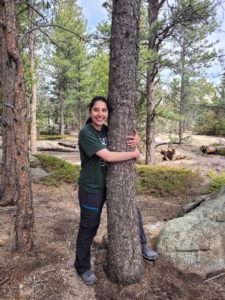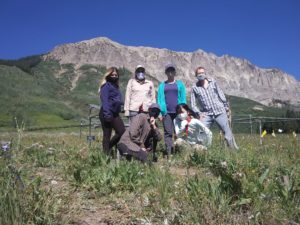
Colorado State University undergraduate senior Ayaka Paul recently published a paper in the New Phytologist journal after attending a summer undergraduate research program in 2020 at the Rocky Mountain Biological Laboratory, a high-altitude biological field station located near Crested Butte, Colorado.
The published article, “Phenotypic plasticity and selection on leaf traits in response to snowmelt timing and summer precipitation,” explores the capacity for various plants in the West Elk Mountains to adapt to changing snowmelt patterns and precipitation rates during the summer months. Phenotypic plasticity describes the ability of an organism to change its physiology or morphology in response to an environmental cause.
As cold area climates face climate change at a rapid pace, the outlook for these plants is crucial to the overall wellbeing of the ecosystem, said Paul, a senior double majoring in conservation biology from the Fish, Wildlife and Conservation Biology department in the Warner College of Natural Resources, as well as in biological sciences.
“It’s important research because early snowmelt is becoming much more common, especially in places like the Rockies,” Paul said. “In ecosystems like these, the viability in plants to survive climate change impacts like these have cascading effects. In this sense, it’s great that this research is coming out now, so we have a better idea of whether or not these plants can survive natural selection.”
To quantify how the manipulated timing of spring snowmelt and amount of summer precipitation would impact the subalpine herb Ipomopsis aggregata, Paul used tools to determine leaf-area index, photosynthetic rate, stomatal conductance and intrinsic water-use efficiency.
The experiment was repeated over three years, taking into account the natural occurrence of snowmelt and summer precipitation in order to examine the natural selection process.
Findings of the study showed that earlier snowmelt is a strong indicator of climate change and can change expression of leaf morphology and gas exchange traits, the same way drought can. In addition, stomatal conductance and specific leaf area showed adaptive plasticity under some of these specific conditions.

Opportunity through scholarship
The RMBL research program Paul attended targets students who wish to conduct a full-time independent research project in field biology. Students conduct independent research under the supervision of RMBL scientists while engaging in a four-week course focused on Rocky Mountain ecosystems or wildlife biology.
During her time at the RMBL summer program, Paul worked alongside assigned mentor Diane Campbell, an evolutionary ecologist and professor at University of California, Irvine.
The experience opened many doors to explore future options, Paul said.
“Working with people, like Diane, who have their Ph.D.s and have been in the field long-term showed me the way they think about research,” Paul said. “It gave me a good insight into what that lifestyle would look like and whether research was something I would enjoy.”
Health mandates due to COVID-19 made social interaction difficult, but Paul said she felt fortunate to attend the program and work at the field station. There were chances to interact and make connections during meals and downtime in the evenings.
The opportunity to participate in the research internship at RMBL was funded through a partnership between the Warner College of Natural Resources and RMBL created to support engagement of CSU students at RMBL.
“Ayaka’s experience at RMBL characterizes the type of experience we are proud of in the Warner College; hands-on, practical learning opportunities that foster building new skills and understanding,” said John Hayes, dean of the Warner College of Natural Resources. “Her co-authorship of these important scientific findings is a terrific outcome of her work at RMBL that will provide a great platform for her future academic and professional pathway.”
Through the experience, Paul said she learned what a future in conservation research could look like and what she can accomplish moving forward.
“The experience gave me a good idea of what that lifestyle would look like and whether or not research and publication were something I would enjoy in my career,” Paul said. “The connections and experiences were priceless.”
To learn more about opportunities with RMBL or other summer internships, visit the WCNR Career Services’ website.